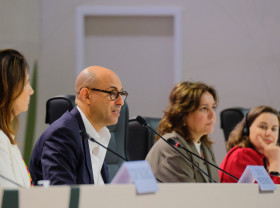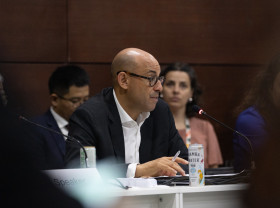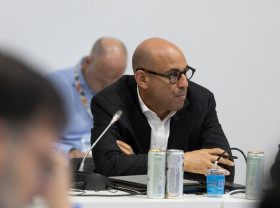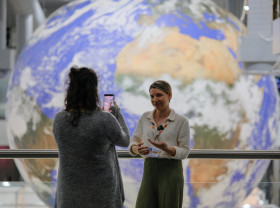The following is the transcript of a speech delivered by UN Climate Change Executive Secretary Simon Stiell on 10 April 2024 at Chatham House in London, England. The speech can also be watched on YouTube.
Two years to save the world…
Good afternoon,
Some of you may think the title of today’s event is overly dramatic. Melodramatic, even.
So let me start by explaining briefly why the next two years are so essential in saving our planet.
First, we know the stakes. You’ve heard me talk before about record shattering heat and massive damage to economies, and how there’s no room for half measures. Let’s take all that as a given.
Second, we are at the start of a race which will determine the biggest winners in a new clean energy economy.
And with the global index of living standards in constant flux, each country’s climate responses will be key to whether they rise up the ladder or fall.
Whether they thrive or barely survive.
Third, for many countries, they will only be able to implement strong new climate plans if we see a quantum leap in climate finance this year.
Fourth, it’s about how the Paris Agreement works.
As of today, national climate plans - called Nationally Determined Contributions or NDCs - in aggregate will barely cut emissions at all by 2030.
We still have a chance to make greenhouse gas emissions tumble, with a new generation of national climate plans. But we need these stronger plans, now.
And while every country must submit a new plan, the reality is G20 emissions are around 80% of global emissions.
So G20 leadership must be at the core of the solution, as it was during the great financial crisis. That’s when the G20 came of age and showed major developed and developing economies can work together to avert global economic catastrophes.
Fifth and finally, every citizen of every country has an opportunity to be part of this transition. Every voice makes a difference. This year and next, we will need every voice more than ever.
Let’s consider for a moment what is up for grabs if we do make the next two years really count.
Bold new national climate plans will be a jobs jackpot and economic springboard to boost countries up that global ladder of living standards.
In the face of crop-destroying droughts, much bolder climate action to curb emissions and help farmers adapt will increase food security, and lessen hunger.
Cutting fossil fuel pollution will mean better health and huge savings for governments and households alike.
The transformative potential of bold climate action - in tandem with steps to advance gender equality - is one of the fastest ways to move away from business as usual.
For those who say that climate change is only one of many priorities, like ending poverty, ending hunger, ending pandemics, or improving education, I simply say this: none of these crucial tasks – indeed none of the Sustainable Development Goals - will be possible unless we get the climate crisis under control.
In fact, business-as-usual will further entrench the gross inequalities between the world’s richest and poorest countries and communities that unchecked climate impacts are making much worse.
These inequalities are kryptonite for cooperative global climate action, and every economy, every country and its people pays the price of that.
To start curing this global cancer of inequality, we need to enable bold new national climate plans by all nations that protect people, boost jobs and drive inclusive economic growth. And we need them by early next year.
The next generation of national climate plans must be investment plans for sustainable and strong economies.
Which brings us back to the crucial importance of climate finance...
…Because it’s hard for any government to invest in renewables or climate resilience when the treasury coffers are bare, debt servicing costs have overtaken health spending, new borrowing is impossible, and the wolves of poverty are at the door.
A quantum leap this year in climate finance is both essential and entirely achievable.
Every day, finance ministers, CEOs, investors, and development bankers direct trillions of dollars. It’s time to shift those dollars from the energy and infrastructure of the past, towards that of a cleaner, more resilient future…
…And to ensure that the poorest and most vulnerable countries benefit.
This year, at COP29 in Baku, we need to agree a new target for climate finance that meets developing country needs. But it’s not enough to agree a target. We need a new deal on climate finance, between developed and developing countries.
That deal should have four key components.
First, more concessional finance. Especially for the poorest and most vulnerable countries.
Second, we need new sources of international climate finance, as the G20, International Maritime Organization, and others are working on.
Third - as Prime Minister Mottley and President Ruto have made clear - we must reform development banks to make them work better for developing countries, embed climate in their decision-making, and build a financial system fit for the twenty-first century.
Fourth, debt relief for the countries that need it most to give them the fiscal space for climate investment. Developing countries spent more than four hundred billion dollars servicing debts last year.
Experts have shown that if we do all of this together, we can meet developing country needs, mobilizing hundreds of billions of dollars.
Ever-closer cooperation between international institutions is more important than ever. I offer UN Climate Change’s partnership wherever it can help to support stronger and faster climate-related outcomes. To the World Bank, IMF at the upcoming Spring Meetings. To the G7, G20, and their finance ministers. Together we can make this deal real.
Together we must step up the pace. The Spring Meetings are not a dress rehearsal. Averting a climate-driven economic catastrophe is core business. It can’t slip between the cracks of different mandates.
We can’t afford a talkfest without clear steps forward, when there is an opportunity to make real progress on every part of the new climate finance deal all nations need.
At the Spring Meetings we need an ambitious round of replenishment for the World Bank’s International Development Association. Doing so could lift hundreds of millions of people out of poverty, and increase clean energy access, especially across Africa.
Progress in Washington DC on revising the World Bank’s capital requirements could free up billions more for concessional lending without asking donors for more money.
Next, to help give countries the fiscal space they need for climate action, the IMF can help more countries deal with debts made worse by climate change and the pandemic. For example, by making more use of the Catastrophe Containment Relief Trust.
The World Bank’s work on Climate Resilient Debt Clauses - which allow countries facing supercharged storms to focus on recovery - are another welcome step in the right direction. Eligibility should now be expanded beyond small and island states to more countries and more climate impacts.
The G7 has a crucial role too, this year chaired by Italy.
G7 governments are the key shareholders in the World Bank and IMF. In truth, they provide both capital and direction. With their say-so, these institutions can do much more to use all the tools at their disposal to deliver large-scale impacts on the ground.
It’s entirely in the interests of every G7 country to take much bolder climate action at home and abroad, including on climate finance.
Firstly, because serious progress on climate finance is a pre-requisite for bold new national climate plans from developing countries, without which all economies, the G7’s included, will soon be in serious and permanent strife.
Secondly, because resilience building is equally urgent to protect the supply chains that all economies depend on. We have just seen what supply chain disruptions flowing from covid did to inflation, and to households and businesses. Well, you can bet your bottom dollar these disruptions and inflationary impacts will only get dramatically worse, without bolder climate action.
So too, the world needs the G20 to rise to this moment.
We are all aware of geopolitical challenges. I do not downplay them. But they cannot be an excuse for timidity, amidst this worsening crisis.
I’ll be candid: blame-shifting is not a strategy. Sidelining climate isn’t a solution to a crisis that will decimate every G20 economy and has already started to hurt.
So the financial firepower the G20 marshaled during the global financial crisis should be marshaled again and pointed squarely at curbing runaway emissions and building resilience now.
Brazil, who also host COP30, has a vital role to play to kickstart the ambitious action we need.
I’m encouraged that the G20, under Brazilian leadership, is exploring ways to find new finance for climate and development. Brazil itself is also trialing new ways to reduce unreasonable borrowing costs for clean energy which could work for other developing countries.
Ultimately, it’s not enough to invest in clean energy and resilient infrastructure without measures that also speed up the decline of fossil fuels. Stronger domestic progress on carbon pricing is essential to reflect the real economics of fossil fuels, including the massive health and economic costs of greenhouse gas pollution, which should not be shunted on to government, households, and other industries to pay.
When I say we have two years to save the world, it begs the question - who exactly has two years to save the world?
The answer is every person on this planet.
More and more people want climate action right across societies and political spectrums, in large part because they are feeling the impacts of the climate crisis in their everyday lives and their household budgets…
…Rising costs for fossil-fuel-powered transport… for heating and cooling… energy… rising food prices as climate disasters hit production and supply chains… to name just a few.
A recent survey by Gallup of 130,000 people in 125 countries found that 89% want stronger climate action by governments.
Yet too often we’re seeing signs of climate action slipping down cabinet agendas.
There is a disconnect - because in living rooms around the world, climate impacts and costs are rising quickly up the list of household worries.
The only surefire way to get climate up the cabinet agenda is if enough people raise their voices.
So my final message today is for people everywhere.
Every voice matters. Yours have never been more important.
If you want bolder climate action, now is the time to make yours count.
Thank you.



